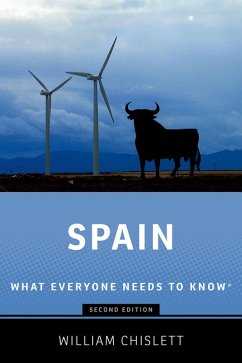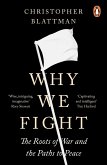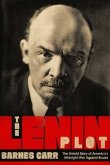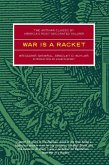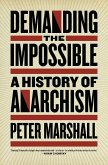14,99 €
inkl. MwSt.
Erscheint vorauss. 7. August 2025

7 °P sammeln
- Broschiertes Buch
- Merkliste
- Auf die Merkliste
- Bewerten Bewerten
- Teilen
- Produkt teilen
- Produkterinnerung
- Produkterinnerung
In the second edition of Spain: What Everyone Needs to Know®, veteran journalist William Chislett updates his comprehensive overview of Spain's history, economy, and politics to contextualize the country's situation in the 2020s. In concise, question-and-answer format, Chislett covers a range of topics, including the legacy of the early Muslim presence, the influx of immigrants and the separatist Catalan region, the transition to democracy after the death of General Franco, the creation of the welfare state, the impact of European Economic Community membership, the 2008-2014 banking and real…mehr
Andere Kunden interessierten sich auch für
![Why We Fight Why We Fight]() Christopher BlattmanWhy We Fight10,99 €
Christopher BlattmanWhy We Fight10,99 €![Dead Doubles Dead Doubles]() Trevor BarnesDead Doubles16,99 €
Trevor BarnesDead Doubles16,99 €![The Lenin Plot The Lenin Plot]() Barnes CarrThe Lenin Plot18,99 €
Barnes CarrThe Lenin Plot18,99 €![In Defence of British India In Defence of British India]() Edward IngramIn Defence of British India48,99 €
Edward IngramIn Defence of British India48,99 €![France, 1848-1945 France, 1848-1945]() Theodore ZeldinFrance, 1848-194550,99 €
Theodore ZeldinFrance, 1848-194550,99 €![War Is a Racket War Is a Racket]() Smedley D ButlerWar Is a Racket11,99 €
Smedley D ButlerWar Is a Racket11,99 €![Demanding the Impossible Demanding the Impossible]() Peter MarshallDemanding the Impossible26,99 €
Peter MarshallDemanding the Impossible26,99 €-
-
-
In the second edition of Spain: What Everyone Needs to Know®, veteran journalist William Chislett updates his comprehensive overview of Spain's history, economy, and politics to contextualize the country's situation in the 2020s. In concise, question-and-answer format, Chislett covers a range of topics, including the legacy of the early Muslim presence, the influx of immigrants and the separatist Catalan region, the transition to democracy after the death of General Franco, the creation of the welfare state, the impact of European Economic Community membership, the 2008-2014 banking and real estate crisis, and the changing political landscape in the last decade. New material analyzes the watershed 2015 general election and the rise of the far right, and presents the key challenges that will shape Spain's future in the years to come.
Hinweis: Dieser Artikel kann nur an eine deutsche Lieferadresse ausgeliefert werden.
Hinweis: Dieser Artikel kann nur an eine deutsche Lieferadresse ausgeliefert werden.
Produktdetails
- Produktdetails
- Verlag: Oxford University Press Inc
- 2 Revised edition
- Seitenzahl: 232
- Erscheinungstermin: 7. August 2025
- Englisch
- Abmessung: 210mm x 140mm
- ISBN-13: 9780197806180
- ISBN-10: 019780618X
- Artikelnr.: 73328835
- Herstellerkennzeichnung
- Libri GmbH
- Europaallee 1
- 36244 Bad Hersfeld
- gpsr@libri.de
- Verlag: Oxford University Press Inc
- 2 Revised edition
- Seitenzahl: 232
- Erscheinungstermin: 7. August 2025
- Englisch
- Abmessung: 210mm x 140mm
- ISBN-13: 9780197806180
- ISBN-10: 019780618X
- Artikelnr.: 73328835
- Herstellerkennzeichnung
- Libri GmbH
- Europaallee 1
- 36244 Bad Hersfeld
- gpsr@libri.de
William Chislett is a writer who has lived in Madrid since 1986. He covered Spain's transition to democracy (1975-78) for The Times of London and was later the Mexico correspondent for the Financial Times (1978-84). He is emeritus senior research fellow at the Elcano Royal Institute. He was granted Spanish nationality in 2021 by Royal Decree.
* List of Tables
* Acknowledgments
* Political Map of Spain
* Introduction
* 1. Historical Background, 800 BC-1939
* Where does the name Spain come from?
* What was the legacy of the Muslim presence between 711 and 1492?
* How did Ferdinand and Isabella forge a united Spanish kingdom?
* How did the Spanish Empire arise?
* Who was Christopher Columbus?
* Who were the conquistadors?
* What was the Spanish Golden Age?
* Why did Spain go into decline in the 17th century?
* What did the Bourbon kings contribute to the modernization of Spain
between 1700 and 1823?
* What was the 1812 Constitution?
* What were the Carlist civil wars between 1833 and 1876?
* Why was the First Spanish Republic (1873-1874) short lived?
* What was the "Disaster" of 1898?
* Why did Alfonso XIII go into exile in 1931?
* What were the causes of the 1936-1939 Civil War?
* Who was General Francisco Franco?
* What were the ideological dimensions of the Civil War?
* What role did foreign intervention play in the Civil War?
* Why did the Republicans lose the Civil War?
* 2. The Franco Regime, 1939-1975
* What kind of dictatorship did General Franco establish after winning
the 1936-1939 Civil War?
* What was the Franco regime's role in the Second World War, and what
happened to it after the defeat of Nazism?
* How was the regime organized politically?
* What was the economic legacy of the Civil War?
* How was the Catholic Church rewarded for supporting General Franco?
* Why was the 1953 military bases agreement with the United States
important?
* What role did the 1959 Stabilization Plan play in creating a modern
economy?
* What is Opus Dei?
* How did Spain become one of the world's main tourist destinations?
* What was the opposition to the Franco regime?
* What is the violent Basque separatist group ETA?
* What impact did the ETA's assassination of Prime Minister Carrero
Blanco in 1973 have on the regime?
* How much did the economy and society change during the Franco regime?
* 3. The Transition to Democracy, 1975-1982
* What happened when Franco died?
* Who is King Juan Carlos I?
* How was the transition to democracy achieved?
* Who was Adolfo Suárez?
* How important was grassroots mobilization and strike action in
pressuring the regime to change?
* What role did the Spanish media play in the transition to democracy?
* What were the main economic problems?
* What were the 1977 Moncloa Pacts?
* What form did the 1978 Constitution take?
* How and why was the system of regional autonomy created?
* How different are the regions?
* Why did the ETA continue its violent campaign for an independent
Basque state?
* Why was there an attempted coup in 1981?
* 4. The Socialist Era, 1982-1996
* Why did the Socialists win a landslide victory in the 1982 election?
* Who is Felipe González?
* How did the Socialists get to grips with the dire economic situation?
* Why and how were the armed forces reformed?
* Why did the Socialists oppose NATO membership and then make a U-turn?
* What was the impact of European Economic Community membership?
* What was the Socialists' foreign policy?
* How did the Socialists create a welfare state?
* How close were the Socialists to meeting the conditions for
membership in the European Economic and Monetary Union?
* What were the Socialists' relations with the Catholic Church?
* What was La Movida Madrileña?
* How did the Socialists advance the system of regional autonomy?
* Why was a "dirty war" waged against the Basque terrorist group ETA?
* What were the corruption scandals that brought down the Socialists?
* 5. The Return of the Right, 1996-2004
* How did the right reinvent itself and return to power in 1996 under
the Popular Party?
* Who is José María Aznar?
* How did the Popular Party meet the conditions to adopt the euro as
Spain's currency?
* What role did privatization play in economic policy?
* What were the Popular Party's other main economic reforms?
* Why and how did Spain create multinational companies?
* How did Spain cope with the influx of immigrants?
* How did the Popular Party try to eradicate the Basque terrorist group
ETA?
* Why did Spain support the US-led invasion of Iraq in 2003?
* Why did Islamic terrorists bomb trains in Madrid on the eve of the
2004 general election?
* 6. The Socialists Strike Back, 2004-2011
* Did the Socialists return to power because of the Islamic terrorist
attack?
* Who is José Luis Rodríguez Zapatero?
* How did Spain become one of the most socially progressive countries?
* How did the Catholic Church react to the reforms?
* What was the Law of Historical Memory?
* What made the economy boom for so long?
* What was the impact of the collapse of the property and construction
sectors?
* What austerity measures were taken?
* What caused the banking crisis?
* What steps were taken to resolve the financial crisis?
* What was the indignant movement?
* What made the political class so unpopular?
* Did the center-periphery tension improve under Zapatero?
* 7. Political Crisis and Economic Recovery, 2012-2024
* How did the Popular Party tackle the economic crisis inherited from
the Socialists?
* Why was the 2015 general election a watershed?
* Why was Spain the last of the big European countries to have a
hard-right party?
* Why was the 2024 amnesty for those involved in the 2017
unconstitutional referendum for Catalonia's independence
controversial?
* 8. The Main Challenges
* Notes
* Selected Suggested Readings in English
* Acknowledgments
* Political Map of Spain
* Introduction
* 1. Historical Background, 800 BC-1939
* Where does the name Spain come from?
* What was the legacy of the Muslim presence between 711 and 1492?
* How did Ferdinand and Isabella forge a united Spanish kingdom?
* How did the Spanish Empire arise?
* Who was Christopher Columbus?
* Who were the conquistadors?
* What was the Spanish Golden Age?
* Why did Spain go into decline in the 17th century?
* What did the Bourbon kings contribute to the modernization of Spain
between 1700 and 1823?
* What was the 1812 Constitution?
* What were the Carlist civil wars between 1833 and 1876?
* Why was the First Spanish Republic (1873-1874) short lived?
* What was the "Disaster" of 1898?
* Why did Alfonso XIII go into exile in 1931?
* What were the causes of the 1936-1939 Civil War?
* Who was General Francisco Franco?
* What were the ideological dimensions of the Civil War?
* What role did foreign intervention play in the Civil War?
* Why did the Republicans lose the Civil War?
* 2. The Franco Regime, 1939-1975
* What kind of dictatorship did General Franco establish after winning
the 1936-1939 Civil War?
* What was the Franco regime's role in the Second World War, and what
happened to it after the defeat of Nazism?
* How was the regime organized politically?
* What was the economic legacy of the Civil War?
* How was the Catholic Church rewarded for supporting General Franco?
* Why was the 1953 military bases agreement with the United States
important?
* What role did the 1959 Stabilization Plan play in creating a modern
economy?
* What is Opus Dei?
* How did Spain become one of the world's main tourist destinations?
* What was the opposition to the Franco regime?
* What is the violent Basque separatist group ETA?
* What impact did the ETA's assassination of Prime Minister Carrero
Blanco in 1973 have on the regime?
* How much did the economy and society change during the Franco regime?
* 3. The Transition to Democracy, 1975-1982
* What happened when Franco died?
* Who is King Juan Carlos I?
* How was the transition to democracy achieved?
* Who was Adolfo Suárez?
* How important was grassroots mobilization and strike action in
pressuring the regime to change?
* What role did the Spanish media play in the transition to democracy?
* What were the main economic problems?
* What were the 1977 Moncloa Pacts?
* What form did the 1978 Constitution take?
* How and why was the system of regional autonomy created?
* How different are the regions?
* Why did the ETA continue its violent campaign for an independent
Basque state?
* Why was there an attempted coup in 1981?
* 4. The Socialist Era, 1982-1996
* Why did the Socialists win a landslide victory in the 1982 election?
* Who is Felipe González?
* How did the Socialists get to grips with the dire economic situation?
* Why and how were the armed forces reformed?
* Why did the Socialists oppose NATO membership and then make a U-turn?
* What was the impact of European Economic Community membership?
* What was the Socialists' foreign policy?
* How did the Socialists create a welfare state?
* How close were the Socialists to meeting the conditions for
membership in the European Economic and Monetary Union?
* What were the Socialists' relations with the Catholic Church?
* What was La Movida Madrileña?
* How did the Socialists advance the system of regional autonomy?
* Why was a "dirty war" waged against the Basque terrorist group ETA?
* What were the corruption scandals that brought down the Socialists?
* 5. The Return of the Right, 1996-2004
* How did the right reinvent itself and return to power in 1996 under
the Popular Party?
* Who is José María Aznar?
* How did the Popular Party meet the conditions to adopt the euro as
Spain's currency?
* What role did privatization play in economic policy?
* What were the Popular Party's other main economic reforms?
* Why and how did Spain create multinational companies?
* How did Spain cope with the influx of immigrants?
* How did the Popular Party try to eradicate the Basque terrorist group
ETA?
* Why did Spain support the US-led invasion of Iraq in 2003?
* Why did Islamic terrorists bomb trains in Madrid on the eve of the
2004 general election?
* 6. The Socialists Strike Back, 2004-2011
* Did the Socialists return to power because of the Islamic terrorist
attack?
* Who is José Luis Rodríguez Zapatero?
* How did Spain become one of the most socially progressive countries?
* How did the Catholic Church react to the reforms?
* What was the Law of Historical Memory?
* What made the economy boom for so long?
* What was the impact of the collapse of the property and construction
sectors?
* What austerity measures were taken?
* What caused the banking crisis?
* What steps were taken to resolve the financial crisis?
* What was the indignant movement?
* What made the political class so unpopular?
* Did the center-periphery tension improve under Zapatero?
* 7. Political Crisis and Economic Recovery, 2012-2024
* How did the Popular Party tackle the economic crisis inherited from
the Socialists?
* Why was the 2015 general election a watershed?
* Why was Spain the last of the big European countries to have a
hard-right party?
* Why was the 2024 amnesty for those involved in the 2017
unconstitutional referendum for Catalonia's independence
controversial?
* 8. The Main Challenges
* Notes
* Selected Suggested Readings in English
* List of Tables
* Acknowledgments
* Political Map of Spain
* Introduction
* 1. Historical Background, 800 BC-1939
* Where does the name Spain come from?
* What was the legacy of the Muslim presence between 711 and 1492?
* How did Ferdinand and Isabella forge a united Spanish kingdom?
* How did the Spanish Empire arise?
* Who was Christopher Columbus?
* Who were the conquistadors?
* What was the Spanish Golden Age?
* Why did Spain go into decline in the 17th century?
* What did the Bourbon kings contribute to the modernization of Spain
between 1700 and 1823?
* What was the 1812 Constitution?
* What were the Carlist civil wars between 1833 and 1876?
* Why was the First Spanish Republic (1873-1874) short lived?
* What was the "Disaster" of 1898?
* Why did Alfonso XIII go into exile in 1931?
* What were the causes of the 1936-1939 Civil War?
* Who was General Francisco Franco?
* What were the ideological dimensions of the Civil War?
* What role did foreign intervention play in the Civil War?
* Why did the Republicans lose the Civil War?
* 2. The Franco Regime, 1939-1975
* What kind of dictatorship did General Franco establish after winning
the 1936-1939 Civil War?
* What was the Franco regime's role in the Second World War, and what
happened to it after the defeat of Nazism?
* How was the regime organized politically?
* What was the economic legacy of the Civil War?
* How was the Catholic Church rewarded for supporting General Franco?
* Why was the 1953 military bases agreement with the United States
important?
* What role did the 1959 Stabilization Plan play in creating a modern
economy?
* What is Opus Dei?
* How did Spain become one of the world's main tourist destinations?
* What was the opposition to the Franco regime?
* What is the violent Basque separatist group ETA?
* What impact did the ETA's assassination of Prime Minister Carrero
Blanco in 1973 have on the regime?
* How much did the economy and society change during the Franco regime?
* 3. The Transition to Democracy, 1975-1982
* What happened when Franco died?
* Who is King Juan Carlos I?
* How was the transition to democracy achieved?
* Who was Adolfo Suárez?
* How important was grassroots mobilization and strike action in
pressuring the regime to change?
* What role did the Spanish media play in the transition to democracy?
* What were the main economic problems?
* What were the 1977 Moncloa Pacts?
* What form did the 1978 Constitution take?
* How and why was the system of regional autonomy created?
* How different are the regions?
* Why did the ETA continue its violent campaign for an independent
Basque state?
* Why was there an attempted coup in 1981?
* 4. The Socialist Era, 1982-1996
* Why did the Socialists win a landslide victory in the 1982 election?
* Who is Felipe González?
* How did the Socialists get to grips with the dire economic situation?
* Why and how were the armed forces reformed?
* Why did the Socialists oppose NATO membership and then make a U-turn?
* What was the impact of European Economic Community membership?
* What was the Socialists' foreign policy?
* How did the Socialists create a welfare state?
* How close were the Socialists to meeting the conditions for
membership in the European Economic and Monetary Union?
* What were the Socialists' relations with the Catholic Church?
* What was La Movida Madrileña?
* How did the Socialists advance the system of regional autonomy?
* Why was a "dirty war" waged against the Basque terrorist group ETA?
* What were the corruption scandals that brought down the Socialists?
* 5. The Return of the Right, 1996-2004
* How did the right reinvent itself and return to power in 1996 under
the Popular Party?
* Who is José María Aznar?
* How did the Popular Party meet the conditions to adopt the euro as
Spain's currency?
* What role did privatization play in economic policy?
* What were the Popular Party's other main economic reforms?
* Why and how did Spain create multinational companies?
* How did Spain cope with the influx of immigrants?
* How did the Popular Party try to eradicate the Basque terrorist group
ETA?
* Why did Spain support the US-led invasion of Iraq in 2003?
* Why did Islamic terrorists bomb trains in Madrid on the eve of the
2004 general election?
* 6. The Socialists Strike Back, 2004-2011
* Did the Socialists return to power because of the Islamic terrorist
attack?
* Who is José Luis Rodríguez Zapatero?
* How did Spain become one of the most socially progressive countries?
* How did the Catholic Church react to the reforms?
* What was the Law of Historical Memory?
* What made the economy boom for so long?
* What was the impact of the collapse of the property and construction
sectors?
* What austerity measures were taken?
* What caused the banking crisis?
* What steps were taken to resolve the financial crisis?
* What was the indignant movement?
* What made the political class so unpopular?
* Did the center-periphery tension improve under Zapatero?
* 7. Political Crisis and Economic Recovery, 2012-2024
* How did the Popular Party tackle the economic crisis inherited from
the Socialists?
* Why was the 2015 general election a watershed?
* Why was Spain the last of the big European countries to have a
hard-right party?
* Why was the 2024 amnesty for those involved in the 2017
unconstitutional referendum for Catalonia's independence
controversial?
* 8. The Main Challenges
* Notes
* Selected Suggested Readings in English
* Acknowledgments
* Political Map of Spain
* Introduction
* 1. Historical Background, 800 BC-1939
* Where does the name Spain come from?
* What was the legacy of the Muslim presence between 711 and 1492?
* How did Ferdinand and Isabella forge a united Spanish kingdom?
* How did the Spanish Empire arise?
* Who was Christopher Columbus?
* Who were the conquistadors?
* What was the Spanish Golden Age?
* Why did Spain go into decline in the 17th century?
* What did the Bourbon kings contribute to the modernization of Spain
between 1700 and 1823?
* What was the 1812 Constitution?
* What were the Carlist civil wars between 1833 and 1876?
* Why was the First Spanish Republic (1873-1874) short lived?
* What was the "Disaster" of 1898?
* Why did Alfonso XIII go into exile in 1931?
* What were the causes of the 1936-1939 Civil War?
* Who was General Francisco Franco?
* What were the ideological dimensions of the Civil War?
* What role did foreign intervention play in the Civil War?
* Why did the Republicans lose the Civil War?
* 2. The Franco Regime, 1939-1975
* What kind of dictatorship did General Franco establish after winning
the 1936-1939 Civil War?
* What was the Franco regime's role in the Second World War, and what
happened to it after the defeat of Nazism?
* How was the regime organized politically?
* What was the economic legacy of the Civil War?
* How was the Catholic Church rewarded for supporting General Franco?
* Why was the 1953 military bases agreement with the United States
important?
* What role did the 1959 Stabilization Plan play in creating a modern
economy?
* What is Opus Dei?
* How did Spain become one of the world's main tourist destinations?
* What was the opposition to the Franco regime?
* What is the violent Basque separatist group ETA?
* What impact did the ETA's assassination of Prime Minister Carrero
Blanco in 1973 have on the regime?
* How much did the economy and society change during the Franco regime?
* 3. The Transition to Democracy, 1975-1982
* What happened when Franco died?
* Who is King Juan Carlos I?
* How was the transition to democracy achieved?
* Who was Adolfo Suárez?
* How important was grassroots mobilization and strike action in
pressuring the regime to change?
* What role did the Spanish media play in the transition to democracy?
* What were the main economic problems?
* What were the 1977 Moncloa Pacts?
* What form did the 1978 Constitution take?
* How and why was the system of regional autonomy created?
* How different are the regions?
* Why did the ETA continue its violent campaign for an independent
Basque state?
* Why was there an attempted coup in 1981?
* 4. The Socialist Era, 1982-1996
* Why did the Socialists win a landslide victory in the 1982 election?
* Who is Felipe González?
* How did the Socialists get to grips with the dire economic situation?
* Why and how were the armed forces reformed?
* Why did the Socialists oppose NATO membership and then make a U-turn?
* What was the impact of European Economic Community membership?
* What was the Socialists' foreign policy?
* How did the Socialists create a welfare state?
* How close were the Socialists to meeting the conditions for
membership in the European Economic and Monetary Union?
* What were the Socialists' relations with the Catholic Church?
* What was La Movida Madrileña?
* How did the Socialists advance the system of regional autonomy?
* Why was a "dirty war" waged against the Basque terrorist group ETA?
* What were the corruption scandals that brought down the Socialists?
* 5. The Return of the Right, 1996-2004
* How did the right reinvent itself and return to power in 1996 under
the Popular Party?
* Who is José María Aznar?
* How did the Popular Party meet the conditions to adopt the euro as
Spain's currency?
* What role did privatization play in economic policy?
* What were the Popular Party's other main economic reforms?
* Why and how did Spain create multinational companies?
* How did Spain cope with the influx of immigrants?
* How did the Popular Party try to eradicate the Basque terrorist group
ETA?
* Why did Spain support the US-led invasion of Iraq in 2003?
* Why did Islamic terrorists bomb trains in Madrid on the eve of the
2004 general election?
* 6. The Socialists Strike Back, 2004-2011
* Did the Socialists return to power because of the Islamic terrorist
attack?
* Who is José Luis Rodríguez Zapatero?
* How did Spain become one of the most socially progressive countries?
* How did the Catholic Church react to the reforms?
* What was the Law of Historical Memory?
* What made the economy boom for so long?
* What was the impact of the collapse of the property and construction
sectors?
* What austerity measures were taken?
* What caused the banking crisis?
* What steps were taken to resolve the financial crisis?
* What was the indignant movement?
* What made the political class so unpopular?
* Did the center-periphery tension improve under Zapatero?
* 7. Political Crisis and Economic Recovery, 2012-2024
* How did the Popular Party tackle the economic crisis inherited from
the Socialists?
* Why was the 2015 general election a watershed?
* Why was Spain the last of the big European countries to have a
hard-right party?
* Why was the 2024 amnesty for those involved in the 2017
unconstitutional referendum for Catalonia's independence
controversial?
* 8. The Main Challenges
* Notes
* Selected Suggested Readings in English
